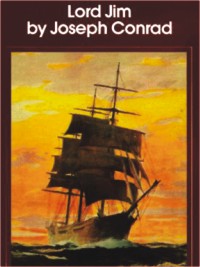| Classic Corner
Lord Jim
Joseph Conrad
 Lord Jim is a novel by Joseph Conrad, originally published in Blackwood's Magazine from October 1899 to November 1900. The novel falls into two parts, a psychological tale about Jim's moral lapse aboard the pilgrim ship Patna, and an adventure story about Jim's rise and fall amongst the people of Patusan, a native-ruled state somewhere in the interior of one of the islands of the East Indies. Some critics have said that the second part of the story is inferior to the first, but it is necessary to the working out of the psychological drama established in the first part. Lord Jim is a novel by Joseph Conrad, originally published in Blackwood's Magazine from October 1899 to November 1900. The novel falls into two parts, a psychological tale about Jim's moral lapse aboard the pilgrim ship Patna, and an adventure story about Jim's rise and fall amongst the people of Patusan, a native-ruled state somewhere in the interior of one of the islands of the East Indies. Some critics have said that the second part of the story is inferior to the first, but it is necessary to the working out of the psychological drama established in the first part.
The novel is remarkable for its sophisticated manipulation of point of view. The bulk of the novel is told in the form of a story recited by the character Marlow to a group of listeners, and the conclusion is presented in the form of a letter from Marlow. Within Marlow's narration, other characters often tell their own stories, in nested dialogue. Thus, events in the novel are described from many points of view, and in many cases, out of chronological order. Such a multi-faceted vision could not be achieved using the point of view of an omniscient narrator, or a first-person narration by Jim.
The reader is left to form an impression of Jim's interior psychological state from these multiple external points of view. But mere facts are inadequate to explain the human condition, as Marlow remarks of the trial: "They wanted facts. Facts! They demanded facts from him, as if facts could explain anything!" Ultimately, Jim remains mysterious, as seen through a mist: "that mist in which he loomed interesting if not very big, with floating outlines--a straggler yearning inconsolably for his humble place in the ranks." [...] "It is when we try to grapple with another man's intimate need that we perceive how incomprehensible, wavering, and misty are the beings that share with us the sight of the stars and the warmth of the sun." It is only through Marlow's recitation that Jim lives for us -- the warm relation between the two men that incites Marlow to "tell you the story, to try to hand over to you, as it were, its very existence, its reality--the truth disclosed in a moment of illusion."
Jim is a young British seaman and mate on the Patna, a ship full of pilgrims performing the hajj. In a momentary lapse (whether of courage, or judgment, or character) during an accident, Jim abandons ship. The court strips him of his nautical certificate for his dereliction of duty. At the trial, he meets Marlow, who befriends him, and tries to find him work as a ship-chandler's clerk. Jim tries to remain incognito, but when his past comes out, he abandons the job and moves further East. This is repeated several times. At length, Marlow's friend Stein suggests placing Jim as his factor in Patusan, a remote inland settlement with a mixed Malay and Bugis population, where Jim's past can remain hidden. Here, Jim wins the respect of the people and becomes their leader by relieving them from the predations of the bandit Sherif Ali and protecting them from the corrupt local Malay chief, Rajah Tunku Allang. Jim wins the love of Jewel, a woman of mixed race, and is "satisfied... almost." The end comes a few years later, when the town is attacked by the marauder "Gentleman" Brown. Although Brown and his gang are driven off, Dain Waris, the son of the leader of the Bugis community, is slain. Jim, by taking responsibility, fulfills his destiny at last, though he ends up dying at the end from a gunshot to the heart.
Copyright
(R) thedailystar.net 2007 |
